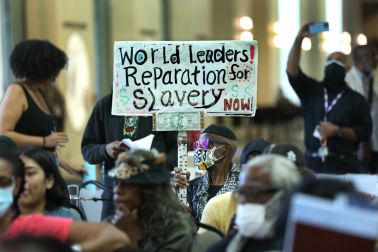
Source: Carolyn Cole / Getty
The California Task Force has made another significant stride in the fight for reparations that could make restitution a reality for Black residents living in the Golden State.
According to Cal Matters, on May 1, the task force released a detailed proposal that outlined several methods that could, in theory, be used to pay reparations to Black Californians who are descendants of slavery.
On Monday, committee members recommended that the state apologizes to Black residents who the lasting effects of slavery and institutional racism have impacted. They also asked officials to consider giving “down payments” of varying amounts to eligible candidates.
How will the payment distribution work?
According to the report, the more than 500-page document did not mention a specific price tag for reparations. Instead, the task force provided a breakdown of how the payment could be calculated based on the amount of money Black Californians have lost from slavery-related atrocities that the government has committed between 1850 and the present day.
Residents who qualify could receive multiple restitution payments to compensate for injustices like mass incarceration, housing discrimination and healthcare inequity. However, payments would vary based on the type of racial harm and how long the individual has lived in California. In the document, task force members estimated that payments could range between “$2,300 per person per year of residence for the over-policing of Black communities, to $77,000 total per person for Black-owned business losses and devaluations over the years,” the report stated.
The payment will be calculated based on a specific timeframe. For example, Black Californians who lived in the state between 1971 and 2020 could receive $159,792 per year if they were a victim of mass incarceration and over-policing during the war on drugs.
A new state agency would have to be established to distribute the funds, Cal Matters noted. The agency would help Black residents in the state trace their lineage to determine their eligibility for payments. If approved, down payments could begin distribution.
Time is running out for the task force to deliver their final proposal. The committee will have until July 1 to give their recommendations to Gov. Gavin Newsom. Members of the force will provide actual reparation amounts in their final agenda.
The task force will meet on May 6 to vote on the proposal.
What is the California Reparations Task Force?
As MADAMENOIRE previously reported, in 2020, Gov. Newsom signed legislation to spearhead the two-year task force to examine slavery’s legacy in America and its effect on Black Americans. Taskforce members have spent the last ten months discussing many topics, from Jim Crow Laws and redlining to housing discrimination and environmental racism, all of which have severely hindered Black Americans’ rights in California and across the U.S.
In March 2022, the committee voted to limit compensation to descendants of free and enslaved Black people living in the United States in the 19th century. Some task members argued that all Black people, including Black immigrants, should be eligible for reparations, but the force ultimately rejected the recommendation.
RELATED CONTENT: California Taskforce Votes In Favor Of Reparations For Black Descendants Of U.S. Enslavement

0 Commentaires